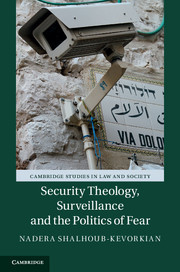Description
Security Theology, Surveillance and the Politics of Fear
Cambridge Studies in Law and Society Series
Author: Shalhoub-Kevorkian Nadera
Examines security theology, surveillance and the industry of fear from the intimate spaces of everyday life in settler colonial contexts.
Language: English
Subject for Security Theology, Surveillance and the Politics of Fear:
Publication date: 05-2015
234 p. · 15.2x22.9 cm · Hardback
234 p. · 15.2x22.9 cm · Hardback
Description
/li>Contents
/li>Biography
/li>
This examination of Palestinian experiences of life and death within the context of Israeli settler colonialism broadens the analytical horizon to include those who 'keep on existing' and explores how Israeli theologies and ideologies of security, surveillance and fear can obscure violence and power dynamics while perpetuating existing power structures. Drawing from everyday aspects of Palestinian victimization, survival, life and death, and moving between the local and the global, Nadera Shalhoub-Kevorkian introduces and defines her notion of 'Israeli security theology' and the politics of fear within Palestine/Israel. She relies on a feminist analysis, invoking the intimate politics of the everyday and centering the Palestinian body, family life, memory and memorialization, birth and death as critical sites from which to examine the settler colonial state's machineries of surveillance which produce and maintain a political economy of fear that justifies colonial violence.
1. Introduction: settler colonialism, the politics of fear and the security theology; 2. Price tagging Palestinians: alternative methods of surveillance and control; 3. Israel in the bedroom: citizenship and entry law; 4. Hunted homeplaces; 5. Death and colonialism: the sacred and the profane; 6. Birth in Jerusalem; 7. Conclusion: newborns, new deaths and the 'gravediggers'.
Nadera Shalhoub-Kevorkian is the Lawrence D. Biele Chair in Law at the Institute of Criminology, Faculty of Law and the School of Social Work and Social Welfare, Hebrew University of Jerusalem. She is a long-time anti-violence, native Palestinian feminist activist and the director of the Gender Studies Program at Mada al-Carmel, the Arab Center for Applied Social Research in Haifa.
© 2024 LAVOISIER S.A.S.




